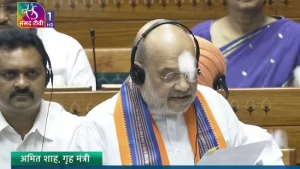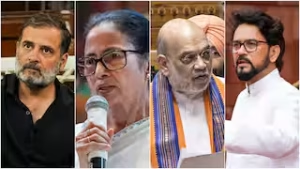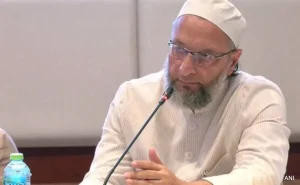New Delhi – The PM CM Bill introduced in Lok Sabha on Wednesday triggered unprecedented chaos as Opposition and ruling party MPs engaged in fierce confrontations over legislation allowing removal of arrested elected representatives. The controversial PM CM Bill package comprises three separate pieces of legislation designed to establish automatic removal mechanisms for Prime Ministers, Chief Ministers, and other constitutional office holders facing serious criminal charges.
The PM CM Bill debate escalated into physical altercations when Trinamool Congress MPs tore copies of the proposed legislation directly in front of Home Minister Amit Shah‘s seat, resulting in brief scuffles between Opposition and ruling party members. This dramatic protest highlighted the intense political stakes surrounding the PM CM Bill and its potential implications for democratic governance.
Comprehensive Legislative Framework for Political Accountability

The PM CM Bill consists of three distinct legislative measures: the Government of Union Territories Amendment Bill 2025, the Constitution 130th Amendment Bill 2025, and the Jammu and Kashmir Reorganisation Amendment Bill 2025. These interconnected bills establish uniform criteria for removing elected officials who remain in custody without bail for 30 consecutive days on charges carrying five-year or longer prison sentences.
Under the PM CM Bill provisions, any Prime Minister, Chief Minister, Union Minister, or State Minister arrested and detained for 30 consecutive days without obtaining bail on serious criminal charges shall be automatically removed from office by the 31st day. The PM CM Bill mechanism empowers the President to remove a Prime Minister and Governors to remove Chief Ministers if they refuse to resign voluntarily.
Opposition Declares Bills Unconstitutional and Anti-Federal

Opposition MPs vehemently opposed the PM CM Bill introduction, declaring the legislation “unconstitutional and anti-federal” during heated parliamentary proceedings. Leader of Opposition Rahul Gandhi characterized the PM CM Bill as returning India to “medieval times when the King could remove anybody at will,” emphasizing concerns about potential misuse of enforcement agencies.
Gandhi specifically warned about the PM CM Bill’s vulnerability to political manipulation, explaining how “He tells ED [Enforcement Directorate] to put a case and a democratically elected person is wiped out within 30 days.” This criticism reflects broader Opposition concerns about the PM CM Bill’s potential for weaponizing investigative agencies against political opponents.
Heated Exchange Between Shah and Venugopal
The PM CM Bill debate intensified when Congress leader K.C. Venugopal directly challenged Home Minister Amit Shah’s credibility on political morality, referencing Shah’s 2010 arrest while serving as Gujarat Home Minister. “When he was the Home Minister of Gujarat, he was arrested. Did he uphold morality at that time?” Venugopal questioned during the PM CM Bill discussion.
Shah responded forcefully to Venugopal’s challenge, defending his conduct and emphasizing his resignation following arrest. “Fake allegations were levelled against me, but despite that, I abided by morality and ethics and not only resigned but did not accept any constitutional post until I was cleared of all charges,” Shah stated, using his personal experience to justify the PM CM Bill framework.
Government Justification: Restoring Political Morality


The government positioned the PM CM Bill as essential legislation for restoring morality and integrity to Indian politics. Home Minister Shah argued that the PM CM Bill addresses public concerns about elected officials continuing in office while facing serious criminal charges, emphasizing the importance of constitutional propriety.
Also Read: Who Is B Sudarshan Reddy? Opposition’s Powerful Candidate Against NDA’s Radhakrishnan
“We cannot be so shameless that we continue to occupy constitutional positions while facing serious charges,” Shah declared while defending the PM CM Bill. This moral argument formed the centerpiece of the government’s justification for introducing such sweeping changes to democratic accountability mechanisms.
Critics Warn of Police State Implications


AIMIM leader Asaduddin Owaisi issued stark warnings about the PM CM Bill’s broader implications for constitutional governance. “The Indian Constitution is being amended to turn this country into a police state,” Owaisi cautioned, highlighting concerns about the legislation’s impact on democratic institutions and individual rights.
Congress MP Manish Tewari similarly criticized the PM CM Bill as fundamentally flawed, stating, “This Bill is against the jurisprudence of criminal justice and distorts Parliamentary democracy. The Bill opens the door for political misuse and throws all constitutional safeguards to the winds.” These criticisms reflect broader concerns about the PM CM Bill’s constitutional validity.
Parliamentary Procedure and Joint Committee Reference
Despite intense Opposition resistance, the PM CM Bill package was referred to a Joint Parliamentary Committee through a voice vote. The committee, comprising 21 Lok Sabha members and 10 Rajya Sabha members, has been mandated to submit its comprehensive report by the Winter Session, typically convened in November’s third week.
RSP MP N.K. Premchandran criticized the PM CM Bill introduction process, alleging procedural violations. “These bills are not being introduced as per the procedures of the House… They have not even been circulated to the members,” Premchandran complained, highlighting concerns about legislative transparency and proper parliamentary protocol.
Physical Confrontations and Security Concerns
The PM CM Bill introduction witnessed unprecedented scenes of physical confrontation when TMC MPs aggressively protested by tearing legislation copies. BJP members, including Union Ministers Kiren Rijiju and Ravneet Singh Bittu, intervened to protect Home Minister Shah, while TMC accused ministers of “pushing and shoving” women parliamentarians.
These dramatic incidents surrounding the PM CM Bill debate underscore the legislation’s contentious nature and its potential to fundamentally alter India’s political accountability framework. The physical altercations reflect deeper constitutional and political tensions about democratic governance and institutional integrity.
Long-term Constitutional Implications
The Bill represents a significant constitutional development with far-reaching implications for Indian democracy’s future trajectory. The legislation’s automatic removal mechanisms could reshape political behavior, electoral calculations, and the relationship between investigative agencies and elected officials.
As the Joint Committee begins its detailed examination of the Bill, the broader debate about political accountability, constitutional propriety, and democratic governance will likely intensify. The committee’s eventual recommendations will significantly influence whether this controversial legislation becomes law and fundamentally transforms India’s approach to political integrity and institutional accountability.

